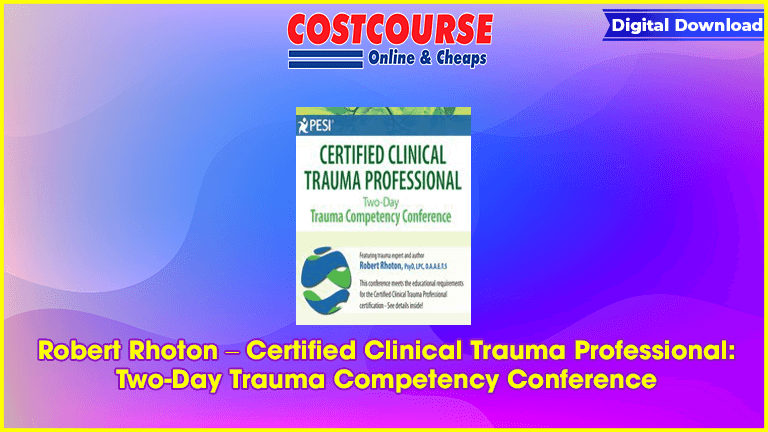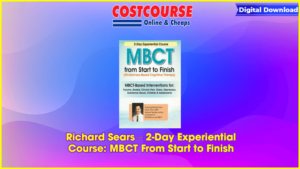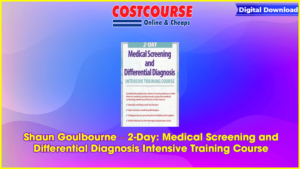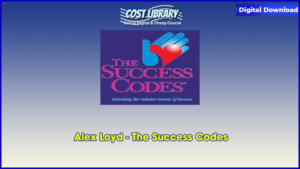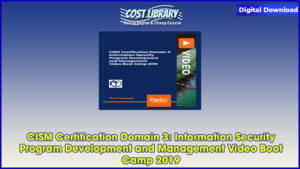Description
The successful resolution of traumatic stress can be simple.
Studies indicate that there are four key elements to effective trauma treatment.
Robert Rhoton – Certified Clinical Trauma Professional: Two-Day Trauma Competency Conference
When you accomplish these four key elements in treatment with your clients, you will be able to reduce their symptoms and improve clinical outcomes.
Watch this live webcast conference and you will walk away with a step-by-step four-stage framework for navigating essential elements of trauma treatment with your traumatized clients.
The essential elements are common to all evidence-based trauma treatments. You will learn how you can integrate this framework with your current approach or methodology to make your trauma treatment even more effective!
This trauma competency training can transform your clinical practice and help improve your trauma treatment outcomes, just as it has for other clinicians around the world.
Best of all, this training meets the educational requirements when applying to become a Certified Clinical Trauma Professional (CCTP) through Evergreen Certifications. Certification lets colleagues, employers, and clients know that you’ve invested the extra time and effort necessary to understand the complexities of trauma counselling. Professional standards apply. Visit www.evergreencertifications.com/CCTP to get started!
Handouts
Manual – Certified Clinical Trauma Professional (10.60 MB) 179 Pages Available after Purchase Updated Slides – Certified Clinical Trauma Professional (4.40 MB) 71 Pages Available after Purchase
Outline
A Brief History and Evolution of Traumatic Stress, Grief & Loss
Systemic traumatic stress theory
Symptom review
Review of effective treatments
Tri Phasic model
Most commonly used instruments to assess traumatic stress
Core Competencies of Traumatic Stress, Grief & Loss
Bio-Psycho-Social-Spiritual Factors that Produce Anxiety & Traumatic Stress
Precipitating events
Meaning making
Physiology of trauma
Perception
Adaptive and Maladaptive Coping Behaviors
Trauma adaptation
Systemic influences
Emotional & psychological stressors
Integrated theoretical concepts from stress, crisis & trauma theories
Information Processing Model
Psychosocial Model
Review of Effective Treatment Interventions
Cognitive Behavioral Techniques (PE, CPT & SIT)
EMDR & Bilateral Stimulation
Thought Field Therapy (TFT)/Emotional Freedom Techniques (EFT)
Sensorimotor
The Biochemical, Affective, and Cognitive Impacts of Traumatic Stress
Affective volatility
The body keeps the score
Biology of traumatic stress
The Impacts of Traumatic Stress Over Time & Across & Within Developmental Stages
Epigenetics
Reactive Attachment Disorder
Adrenal fatigue
The Role of Traumatic Stress in Clinical Disorders such as Personality Disorders, Dissociative Identity Disorder, and More
Traumagenesis
Traumaddiction
Comorbidity
Conceptualizing a Framework of Healing for Survivors of Traumatic Stress
Systemic perspective
Strengths perspective
Traumatic Stress Exists Across the Continuum of Systemic Levels
Systemic trauma theory
Community trauma
Vicarious secondary traumatization
Theories of Traumatic Stress, Loss and Grief
Information Processing Model
Psychosocial Model
Contemporary thoughts
Bereavement and Adjustment Disorders
Supporting normal bereavement
Treating complicated bereavement
Assessment of Traumatic Stress Disorders
Diagnostic and Statistical Manual of the APA
DSM-5® changes
ACE & Developmental Trauma
Diagnosing PTSD with the PCL-5
Evidence-Based Techniques/Interventions
Relaxation/Self-regulation
Grounding
Containment
Writing/journaling
Drawing art
Healing metaphors
Transitional objects
Demonstrations: Interactive Exercises/Application of Skills
Cognitive Behavioral Techniques
Narrative Exposure Therapy Technique
Thought Field Therapy (TFT)
Bilateral Stimulation
Limitations of the Research and Potential Risks
Limitations of many accepted models of trauma treatment
Weaknesses and limitations of evidence-based trauma treatment models
Limitations of the diagnostic (DSM-5®) system
Limitations and potential risks in grief work, due to research scarcity on the topic
Closure: Lessons Learned

